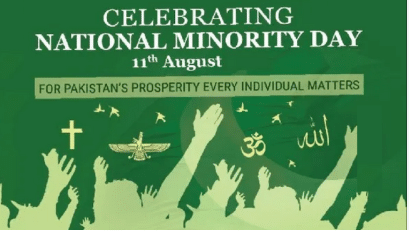KEYWORDS
Minorities Day 2024, Karachi Frere Hall, Minority Rights March, Quaid-i-Azam Speech, Social Justice in Pakistan, Forced Conversions, Child Marriage, Religious Freedom, Pakistan Human Rights
On National Minorities Day, a large gathering at Frere Hall in Karachi saw passionate calls for safeguarding the rights of Pakistan’s minority communities. The event, marking August 11 as a day of remembrance and advocacy, emphasized the urgent need for government action to protect and uplift marginalized groups.
A Day of Historical Significance
National Minorities Day, officially declared in 2009, coincides with the historic speech made by Quaid-i-Azam Mohammad Ali Jinnah on August 11, 1947. Jinnah’s address to the Constituent Assembly of Pakistan envisioned a nation committed to religious freedom, equality, and the protection of all citizens, regardless of their faith, caste, or creed. The day serves as a reminder of these foundational promises and the ongoing struggle to realize them.
Minorities Rights March 2024: A Collective Voice for Change
The 2024 Minorities Rights March, organized by a coalition of political, religious, social, non-profit, and government organizations, brought together a diverse crowd at Frere Hall. Participants, many dressed in white with vibrantly colored stoles designed by Priyanka Kapoor, one of the event’s organizers, called for immediate solutions to the pressing challenges facing minority communities.

Among the banners displayed, one read, “Kam umari ki shaadi na-manzoor” (Child marriages are unacceptable), while another starkly stated, “Wajid Lashari killed me for refusing to marry him and convert. A jirga settled the case, and now he’s free,” referencing the tragic murder of Pooja Kumari, an 18-year-old Hindu girl.
Voices of the Marginalized
Activists and community leaders addressed the crowd, highlighting the injustices faced by minorities. Pastor Ghazala, a dedicated advocate for minority rights, voiced her frustration, saying, “Our daughters are kidnapped and forcibly converted, yet no one takes notice. This is the injustice we are here to confront, and we will keep speaking out until our voices are heard.”
Ajay Kumar, another participant, shared a personal perspective: “I come from a family where women aren’t allowed to leave their homes—not because we don’t believe in empowerment, but because we know the world is unsafe for them the moment they step outside.”
Jaint Kumar, a core organizer of the march, challenged the discriminatory laws that prevent non-Muslims from serving as prime minister or president in Pakistan. He urged the nation to uphold Jinnah’s vision of equality, stating, “Minorities were as much a part of the government as Muslims, so why do we face this injustice in the present era?”
Solidarity and Support from Across Communities
The event also featured participation from climate activist Ahmad Shabbar, founder of GarbageCAN, who linked environmental justice with social equality. “We know these people are struggling to make themselves heard, and it is because of the unequal distribution of rights and facilities,” he said.
In a symbolic act of protest, a burnt Christmas tree was displayed with a sign that read, “How can we take selfies with a Christmas tree when our houses, worship places, Bibles, and crosses are burned?” This powerful image referenced a recent incident where the IG Police Punjab encouraged people to take selfies with a Christmas tree, contrasting sharply with the lived experiences of minority communities.
A Call for Inclusivity and Equality
The day concluded with a spirited performance by the Mai Dhai group, who used their art to brighten the rainy afternoon, leaving participants with a renewed sense of purpose and determination. Justice Naimatullah Phulpoto, senior puisne judge of the Sindh High Court, assured the crowd, “The law protects all minorities, however, the implementation has been a problem, but we assure everyone that we will assist our brothers and sisters in every matter possible.”
As the marchers dispersed, their voices echoed with a collective demand: the promise of equal rights and protection for all, regardless of their faith, must be fulfilled. National Minorities Day 2024 was not just a celebration but a powerful reminder of the work still needed to achieve true equality in Pakistan.
